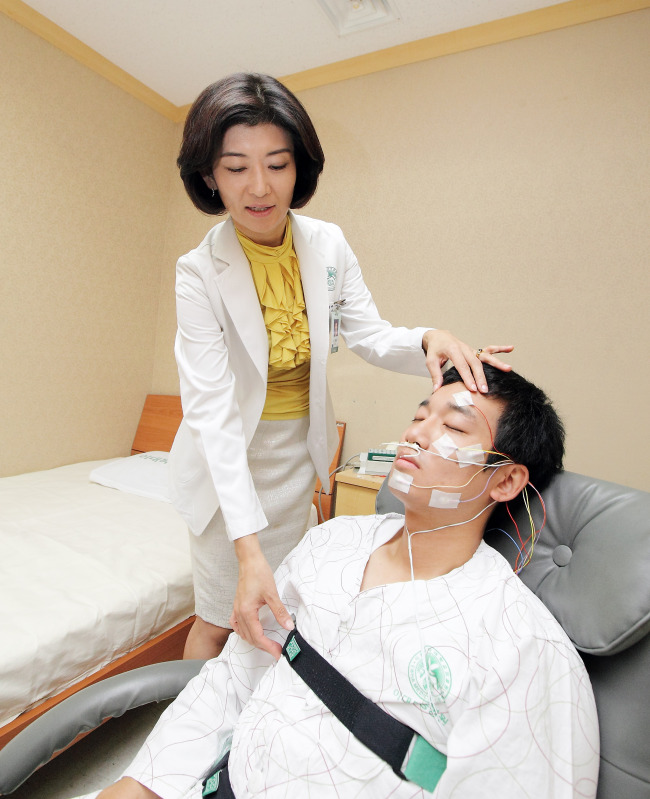[Weekender] Sleep-deprived Koreans vulnerable to health threats
By Korea HeraldPublished : March 13, 2015 - 19:27
Last year, South Korea’s national health insurance agency formed a special task force to combat obesity, as the number of obese Koreans has increased dramatically in the past decade.
As of 2013, 32.4 percent of all adult Koreans were obese, and so were 25 percent of all boys. The number of obese Korean men had doubled since 2003, while the number of Korean women with the condition increased by 30 percent in the same period.
While the Health Ministry says higher consumption of fast food and physical inactivity are likely to be the major risk factors, some experts think the statistics have to do with something else ― the nation’s collective sleep deprivation.
As of 2013, 32.4 percent of all adult Koreans were obese, and so were 25 percent of all boys. The number of obese Korean men had doubled since 2003, while the number of Korean women with the condition increased by 30 percent in the same period.
While the Health Ministry says higher consumption of fast food and physical inactivity are likely to be the major risk factors, some experts think the statistics have to do with something else ― the nation’s collective sleep deprivation.

Overseas studies show that those who are consistently sleep deprived ― getting less than seven to eight hours nightly ― have a higher risk of depression, Type 2 diabetes, cardiovascular disease and obesity. In 2013, a single Korean person on average slept less than seven hours a day, which was the lowest among the countries in the Organization for Economic Cooperation and Development.
Also in the same year, Koreans worked the second-longest hours among members of the OECD, 30 percent longer than the OECD average.
“One thing that sleep does is balance our appetite,” said neurologist Lee Hyang-woon.
“It does that by regulating the levels of the hormones that control our feelings of fullness and hunger. Those who are sleep-deprived may often feel that they need to eat more. Lack of sleep can also disrupt fat metabolism.”
A recent overseas study suggested that missing just 30 minutes of sleep during weeknights could lead to obesity and other health problems.
Especially, weekday sleep debt may lead to long-term metabolic disruption that promotes the onset of or worsening of Type 2 diabetes mellitus, the study found.
The study, authored by professor Shahrad Taheri at Cornell Medical College in Doha, Qatar, also found that catching up on sleep on weekends did not do anything to reverse the effects of weekday sleep debt.
Meanwhile, the number of Koreans with depression, which can be both the cause and result of insomnia, also increased from 556,000 in 2009 to 665,000 in 2013.
Lee said this may be also linked to lack of sleep, especially REM sleep. Also called paradoxical sleep, REM sleep lets us forget what we don’t particularly want to remember, like a “second gut,” the sleep specialist said.
“It somehow reads your subconscious mind and selects what will be permanently stored in your long-term memories, and what will be deleted,” she said.
“This is why many people feel much better after a good night’s sleep, even if they had a bad day the day before.”
As REM sleep is thought to be essential for memory consolidation, feelings and moods, not getting enough of it can bring a number of undesirable consequences.
“If you don’t get enough REM sleep, it’s easy for you to become anxious, depressed and hysterical,” she said.
“It also makes it hard for you to focus and makes you more easily irritated, and this can eventually lead to sleep disorders.”
Lee also noted that many Koreans have poor sleep hygiene. Sleep hygiene is a variety of practices that are required to have normal nighttime sleep and full daytime alertness.
“One of the biggest problems is that there is too much noise and light in the city,” the sleep specialist said. “Try to block out all distracting noise and eliminate as much light as possible. And don’t play with your phone at least for an hour before bedtime. Don’t place your electronic devices on your bed.”
By Claire Lee (dyc@heraldcorp.com)
-
Articles by Korea Herald




















![[Today’s K-pop] BTS pop-up event to come to Seoul](http://res.heraldm.com/phpwas/restmb_idxmake.php?idx=642&simg=/content/image/2024/04/17/20240417050734_0.jpg&u=)